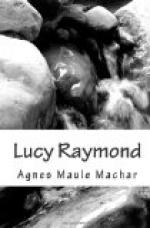Alick found the rest of the party exploring the farmyard, admiring the cows, particularly Mrs. Ford’s sleek, glossy black favourite; while Harry was, to his intense delight, cantering up and down the road to the gate, on the stout little pony which the farmer usually rode to market.
As there was a full moon, there was no hurry about returning; and on the arrival of Mr. Raymond, who had walked over to meet them, Mrs. Ford insisted on their coming in for a while. And before they took their leave she brought out her large family Bible for evening worship, with the request that Mr. Raymond would read and pray before his departure; “for,” she said, “I know we don’t mind these things half enough, and we’d be all the better of a word or two from you.”
Mr. Raymond read the last chapter of Ecclesiastes, making a few brief but impressive comments on the insufficiency for true happiness of the enjoyments which this life can furnish, fair and good gifts of God though such enjoyments may be. “The time would come, even in this life,” he said, “when the joys of this world would be found wanting. And after this life, what would be their condition who had made this world their portion, and had ’not remembered their Creator in the days of their youth?’” Doubt-less the thought of his own youthful circle, and of the strong, ruddy young Fords, all so full of health and life and joyous spirits, was strongly upon him when he dwelt so earnestly upon the words: “Rejoice, O young man, in thy youth, and let thy heart cheer thee in the days of thy youth, and walk in the ways of thy heart and in the sight of thine eyes; but know thou, that for all these things God will bring thee into judgment.”
Then, reading part of the third chapter of the First Epistle of John, he directed his hearers to the wonderful privileges provided for them, so far transcending all mere temporal gifts—to the “love the Father hath bestowed, that we should be called the sons of God,”—showing how these privileges were to be grasped through faith in the love which laid down life for us; and how that love, flowing into the heart, was to purify the life by enabling us to do the things which are pleasing in His sight.
The solemn, earnest words—few, but well chosen—seeming to come with peculiar power after the day of joyous excitement, touched responsive chords in the hearts of most of the young party, who looked earnest and thoughtful; though who could tell whether the impression should be an abiding one, or should pass away like the “early dew?” Lucy and Bessie listened with real interest—the latter, especially, with much more than she would have felt a few days before; and Mrs. Ford silently renewed her good resolutions to seek to influence her family to choose the “better part, which could not be taken away from them.”
Lucy could not help glancing at Stella when the verses in the chapter about want of compassion for the brother or sister in need were read; but Stella looked placidly unconscious, and indeed her thoughts were far away,—considering how she should best impress Marian Wood, on their way home, with a due sense of the grandeur of her city life.




